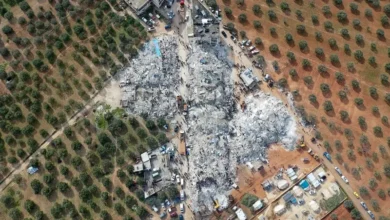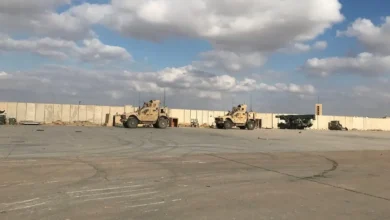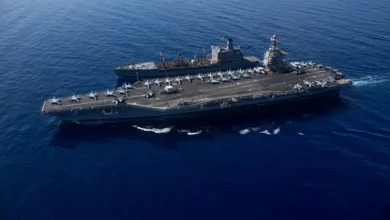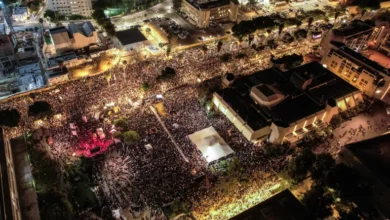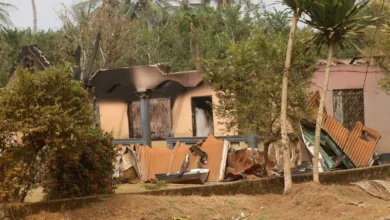US forces sink ‘Houthi’ boats in Red Sea after attack on Maersk vessel
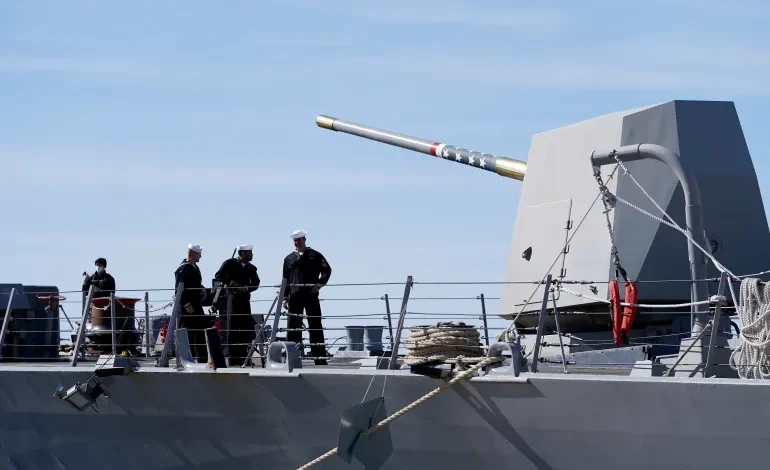
The United States military says it has sunk three boats waging an attack on a container ship in the Red Sea as it continues its patrol mission to counter threats from Yemen’s Houthi rebels.
Helicopters from two US warships – the USS Eisenhower and USS Gravely – shot at the “Iranian-backed Houthi small boats” in self-defence on Sunday morning while responding to an SOS call from the Singapore-flagged vessel Maersk Hangzhou, the US Central Command (CENTCOM) said. The US helicopters sunk three of the boats, killing several of their crew, it said. A fourth boat escaped.
Maersk Hangzhou issued its distress call after it was fired at by the Houthi boats, which came as close as 20m (65 feet) and also tried to board it, CENTCOM said in a statement on X, formerly known as Twitter.
As the US helicopters responded, they were also shot at by the Houthi boats, prompting them to return fire, added the CENTCOM statement.
It was the second alleged Houthi attack on the Maersk Hangzhou in less than 24 hours. Late on Saturday night, CENTCOM said it shot down two ballistic missiles fired by the Houthis as it responded to a separate missile strike on Maersk Hangzhou.
In the wake of the attacks, global shipping giant Maersk, which owns the vessel, said it was suspending its operations in the Red Sea for 48 hours, highlighting the continued threat to commercial vessels in the region.
Red Sea attacks
Amid Israel’s war on Gaza, Yemen’s Iran-aligned Houthis have repeatedly targeted vessels they believe are linked to Israel travelling in the Red Sea, pushing major global shipping companies, such as Maersk, to abandon the waterway. The Houthis have said they will continue their strikes until Israel’s attacks on Gaza stop.
The US on December 19 announced a global naval task force to safeguard shipping in the contentious waters, through which some 12 percent of global trade passes.
However, out of the 20 countries the US says have agreed to support the coalition, only the United Kingdom has directly contributed warships, leaving Washington to effectively “act alone” against the Houthis, reports Al Jazeera’s Resul Serdar from Djibouti on the edge of the Red Sea.
“There is very little naval presence here,” said Serdar.
And while the presence of the US-led coalition at first seemed to restore some confidence in the route, Houthi attacks on passing vessels have not stopped.
Increasingly, the group is using anti-ship ballistic missiles to target vessels, US Vice Admiral Brad Cooper told The Associated Press news agency, adding that the US is “clear-eyed that the Houthi reckless attacks will likely continue”.
He said the latest clash marked a serious escalation because the US not only sunk Houthi boats but killed Houthi fighters. Such confrontations are sparking “huge panic” among Yemenis who fear the conflict could spill into their territory, he said.
“That could cause another war that would damage the region,” said Serdar.
The unrest in the Red Sea comes as anger grows throughout the Middle East over the devastation in Gaza, where at least 21,822 Palestinians, including 8,800 children, have been killed by Israel military attacks in under three months.
The war began when Hamas carried out a shock cross-border attack on Israeli territory on October 7 that killed about 1,140 people, mostly civilians, according to Israel.
The US, which has provided staunch military and diplomatic backing to Israel throughout the conflict, has seen its assets targeted as well, facing more than 100 attacks from Iran-backed groups in Syria and Iraq since the outbreak of the war.
Are communications cables safe?
Amid concerns that Yemen’s Houthis could next target crucial submarine communications cables running under the Bab al-Mandeb Strait that power internet networks, Yemen’s Ministry of Foreign Affairs said it is committed to protecting these networks.
“Yemen’s decision to prevent the passage of Israeli enemy ships does not concern ships belonging to international companies licensed by Maritime Affairs – Sanaa to execute marine cable works,” the ministry said.
However, it added that ships “executing submarine cable works” should “obtain the necessary permits and approvals”.

